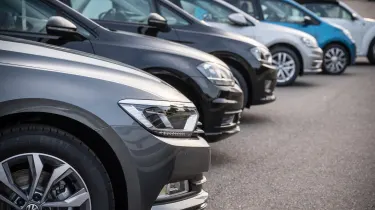
The Chancellor has doubled the cost of the first year’s Vehicle Excise Duty (VED/road tax) for buyers of many new models, in a measure the government says increases the differential between fully electric and internal-combustion vehicles.
With effect from April 2025, the standard rate of road tax will increase only by the rate of inflation, but anyone buying a car after that date will face a much bigger road tax bill if their car emits more than 75g per kilometre of CO2. From that 75g threshold, and across every higher CO2 charging band, the government is doubling the rates for first-year road tax in a blanket measure that it says will raise £400m for treasury funds next year - and £1.7bn by the end of the decade.
For the worst-affected high-performance and luxury cars emitting more than 255g/km - such as the V8 petrol Range Rover - the first-year road tax rate jumps from an already hefty £2,745 to an eye-watering £5,490. However even buyers of small superminis like a 1.2-litre hybrid Vauxhall Corsa emitting 102g/km of CO2 take a significant hit, with their first-year rate doubling from £195 to almost £400. The sliding scale of charging bands itself is kept unchanged.
The bad news for car buyers doesn’t end there, because first-year VED rates for cars emitting up to 50g/km and 75g/km of CO2 will rise to £110 and £130 respectively. Up until April 2025, buyers of those cars pay just £10 and £30 respectively. And in what appears to be a harbinger for more tax hikes ahead, electric cars will no longer escape with a zero rate for VED. From April they’ll pay road tax like everyone else, but with only a £10 annual charge being levied.
The Chancellor hasn’t yet acted on the supplement to VED charged on cars costing more than £40,000, despite pleas from the industry to increase the price threshold which from April next year threatens to deter buyers of expensive EV models. However the budget briefing document says: “The government recognises the disproportionate impact of the current VED Expensive Car Supplement threshold for those purchasing zero-emission cars and will consider raising the threshold for zero-emission cars only at a future fiscal event, to make it easier to buy electric cars.”
The government is providing longer-term certainty on favourable Benefit-in-Kind rates for EVs, currently the main driver for EV take-up in the UK, but it’s at the expense of hybrid drivers. The government states: “Company Car Tax rates will continue to strongly incentivise the take-up of electric vehicles, while rates for hybrid vehicles will be increased to align more closely with rates for internal combustion engine (ICE) vehicles, to focus support on electric vehicles.”
Benefit-in-kind rates are already fixed until 2027, but the Chancellor has laid out a formula from 2028-2029 that will see rates for zero-emission vehicles rise by 2 per cent annually to 9 per cent.
BiK tax for hybrid vehicles will rise to 19 per cent by 2029 - more than doubling compared with current levels - while tax rates for all other vehicles will rise by one per cent per year.
The government also addressed what many consider to be a loophole around the use of luxury 4x4 double cab pick-ups. From April next year they’ll be treated the same way as cars for the purposes of capital allowances and Benefit-in-Kind, although users of existing vehicles will have transitional arrangements, allowing them be taxed at the current rates until 2029.
